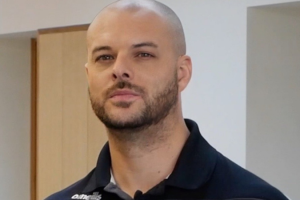New report identifies barriers to diversity in football governance

Culture clashes, casual racism, opaque recruitment pathways and lack of trust in the system have all been highlighted as reasons members of the British South Asian community lack representation in managerial, administrative and governance positions in English football, according to new research published today.
The research, carried out by Dr Stefan Lawrence, senior lecturer in socio-cultural aspects of sport and leisure at Newman University, Birmingham; Dr Thomas Fletcher, Reader in the School of Events, Tourism and Hospitality Management at Leeds Beckett University; and Dr Daniel Kilvington, senior lecturer in Media and Culture Studies at Leeds Beckett University, documents the lived experiences of British South Asian professionals working in the football industry to help identify recruitment mechanisms and inform the inclusion, equality and diversity agenda across all levels of UK football.
Based on over 36 hours of in-depth interviews, the research team identified a range of issues that continue to limit opportunities for British South Asian communities to build careers in football, contributing to a lack of diversity in the management and governance of the game.
Dr Lawrence said: “At a time when allegations of racism have shaken the world of cricket, it would be reasonable to hope that greater strides have already been made in football but our research demonstrates that this simply isn’t the case.
“From overtly racist comments and ‘jokes’ in boardroom settings to stereotypical assumptions about British South Asians’ professional and sporting interests, our discussions highlighted how a range of structural and cultural issues persist in limiting opportunities for both South Asian professionals to make their way in the sport but also for the game itself to benefit from their expertise.”
Challenges to progression identified included the need to develop a personal brand – often based on previous playing experiences – for higher-level roles, the importance of ‘towing the line’ or ‘not making waves’ if you wanted to progress, the benefits of having ‘white allies and advocates’ to help South Asian professionals make their case in meetings, and assumptions that those not already within the industry know about key recruitment pathways, such as the general reliance on agencies to headhunt talent for governance roles.
The research also highlighted a lack of trust in the system among interviewees to enable careers in the sport for qualified professionals from South Asian backgrounds – often shaped by older generations’ experiences in the game. It also highlighted a ‘burden of representation’ felt by some community members who did make their way in the game to take on additional responsibilities, of needing to become a role model for diversity, a sometimes lone voice for race equality, and even to be asked to speak on behalf of communities to which they do not ascribe or belong.
Dr Lawrence continued: “Football is a hugely popular sport across all communities, with more British Bangladeshi boys playing football regularly in the UK than their white British counterparts. However, despite South Asian communities making up 7% of the UK population, just 0.25% go on to be professional footballers in England, with even fewer moving in administrative or governance roles.
“Crucially, our research revealed that there is no lack of interest in pursuing football careers among these communities, but while enthusiasm for the sport and qualifications can take people so far, a lack of transparency surrounding career paths, hidden recruitment processes, and a sense that all too often footballing authorities are more motivated by ‘being seen to do the right thing’ than by a genuine commitment to placing diversity at the heart of the sport, mean this talented community is currently under-represented across the industry.
“Social justice is at the very core of my research agenda but also the curriculum for both the Sport Management tan dSport Development with coaching programmes we offer at Newman. While the university may be personable and community orientated, it supplements this ethos with a national and global outlook. This report, which is done in collaboration with partners across the football industry, is testament to that mission and aims to tackle some for he major issues at the heart of sport governance and society.”
Stefan featured on Sky Sports News on Wednesday 16th February to discuss his research.
The full report, titled ‘Equality’s Everyone’s Job’ is available online.
